人教精通版六年级英语上册各单元知识点汇总
人教精通英语六年级上册语法总结

语法总结⚫介词用法:1.具体日期前用on2.具体几点前用at3.时间段前用for4.月份前用in5.in the morning/afternoon/evening6.on the eve of 在…的前夜⚫感官动词:感官动词+形容词感官动词都翻译为“…起来” 常见感官动词:look看起来⚫频率副词(从小到大排列)never—sometimes——often——usually——always注意:主语用主格,宾语用宾格。
如何快速判断主语和宾语呢?——先翻译成汉语再判断例如:汉语:你主语序数词:⚫祈使句⚫现在进行时1.表示现在正在发生2.look,listen,now是现在进行时的标志3.基本结构:be+doing⚫一般现在时1.表示经常性,习惯性的动作2.频率副词出现,是一般现在时的标志3.一般现在时中,动词只有两种形式:原形/三单⚫句型题做题步骤先判断句子中的动词是be动词/情态动词/实义动词哪一种如何判断——排除法(be动词3个,情态动词7个,上面已写。
如果都不是,则是实意动词)否定句口诀:否定句,也不难,be后情后not添实意动词找帮手,don’t, doesn’t动前添谓语动词要还原一般疑问句口诀:有情提情,有be提be有实用助,有助还原注意:几个固定的特殊疑问句需要记住1. 问价格How much 开头 如:How much is it? / How much are they?2. 问数量 How many 开头 如:How many English lessons do you have in a week? ⚫ 三单的概念“三单”即“第三人称单数”第三人称单数包含两个特征:第三人称+单数如何快速判断第三人称单数——排除法 一个词既不是“你/你们/我/我们”,也不是复数,那么就是第三人称单数 特殊记忆:every 出现就是三单 “三单”后的动词也要变“三单”,有以下三种变法:1. 加s —比如like -likes2. 加es —比如watch -watches3.不规则变化—比如have -has 注意:单词以下列字母结尾需要加es ——x, ch, sh, o, y (把y 改i 加es ),f/fe (把f/fe 改v加He doesn’t like bananas.es)⚫感叹句结构:How+形+主+谓(动)!⚫There be句型就近原则:谁跟be离得近,be就跟谁保持一致⚫其他语法总结:1.be +形容词+to do比如:be happy to do /be difficult to do/ be pleased to do…2.go home / go back home home前不用to3.do some+doing 比如:do some reading4.by+方式比如:by email5.How about = What about6.learn from 向….学习7.have a look看一看look at…看一看…(后面接要看的东西)8.look here/there 看这里/那里here/there前不加to9.interesting修饰物,interested修饰人10.be interested in… 对…感兴趣(由于in是介词,因此后面动词要用doing形式)11.photo复数photos12.take care of 照顾13.Here is/are ….for…. 这是给….的…..14.invite….to…. / give….to…. / come to / celebrate ….with….15.What shape (of cake)would you like? 答语中一定有shape16.Show +某人’s/形物代+ love +for… 为…展示…的爱比如:show my love for mum17.jelly, ice cream, candy 不可数,不能变复数18.Shall we+ do19. a piece of / some pieces of20.first首先/ then/after that/next然后/ finally/at last最后21.have a holiday/ have summer holidays/have winter holidays 放假/放暑假/放寒假22.be called 被称为be founded 被建立23.at home在家24.make+人/物+形容词使某人/某物变得… 比如:make the country greener25.all over the world 全世界26.share…with… 和…分享…27.School is out. 学校放假。
六年级上册英语人教版重点知识
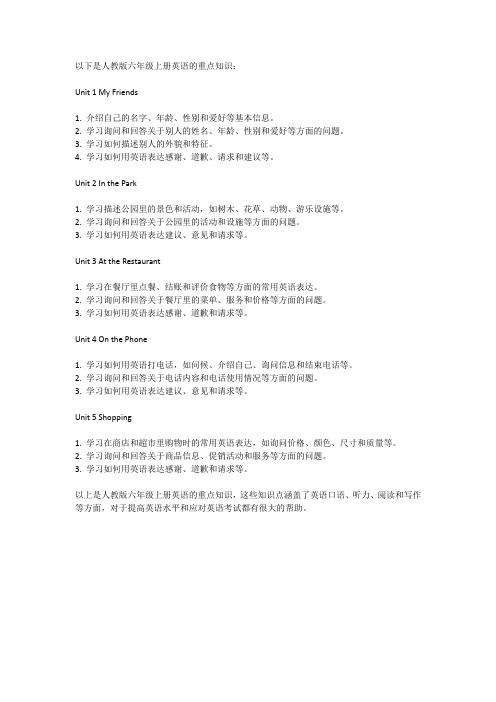
以下是人教版六年级上册英语的重点知识:
Unit 1 My Friends
1. 介绍自己的名字、年龄、性别和爱好等基本信息。
2. 学习询问和回答关于别人的姓名、年龄、性别和爱好等方面的问题。
3. 学习如何描述别人的外貌和特征。
4. 学习如何用英语表达感谢、道歉、请求和建议等。
Unit 2 In the Park
1. 学习描述公园里的景色和活动,如树木、花草、动物、游乐设施等。
2. 学习询问和回答关于公园里的活动和设施等方面的问题。
3. 学习如何用英语表达建议、意见和请求等。
Unit 3 At the Restaurant
1. 学习在餐厅里点餐、结账和评价食物等方面的常用英语表达。
2. 学习询问和回答关于餐厅里的菜单、服务和价格等方面的问题。
3. 学习如何用英语表达感谢、道歉和请求等。
Unit 4 On the Phone
1. 学习如何用英语打电话,如问候、介绍自己、询问信息和结束电话等。
2. 学习询问和回答关于电话内容和电话使用情况等方面的问题。
3. 学习如何用英语表达建议、意见和请求等。
Unit 5 Shopping
1. 学习在商店和超市里购物时的常用英语表达,如询问价格、颜色、尺寸和质量等。
2. 学习询问和回答关于商品信息、促销活动和服务等方面的问题。
3. 学习如何用英语表达感谢、道歉和请求等。
以上是人教版六年级上册英语的重点知识,这些知识点涵盖了英语口语、听力、阅读和写作等方面,对于提高英语水平和应对英语考试都有很大的帮助。
小学英语人教精通版六年级上册重点归纳

--小学英语人教精晓版六年级上册要点概括第一单元 Unit 1 I go to school at 8:00 要点单词:lunch午餐dinner晚餐walk走;步行every每一个morning早上afternoon下午evening 夜晚often常常;常常easy 简单difficult困难要点词组:1. daily life平时生活2. get up起床3. in the morning在早晨上午4. in the afternoon在下午5. in the evening在晚上6. have breakfast吃早餐7. have lunch吃午餐8. have dinner吃晚饭9. go to school去上学10. go home回家11. watch TV看电视12. do some reading阅读13. go to bed睡觉14. cook breakfast做早餐15. take a walk散步16. teach English教英语17. read stories读故事18. every morning每日清晨19. on Saturdays在星期六20. on Sundays在礼拜日21. see a film看电影22. have piano lessons上钢琴课23. play the piano弹钢琴24. at home在家25. help sb. to do the housework帮助某人做家务26. clean the door擦门27. clean the window擦窗户28. clean the floor擦地板要点句型:1.I don ’t have breakfast at 7:00 in the morning .我不是在清晨七点钟吃早餐。
2.She gets up at 6:00 in the morning .她在清晨六点钟起床。
六年级上册英语书人教版精通
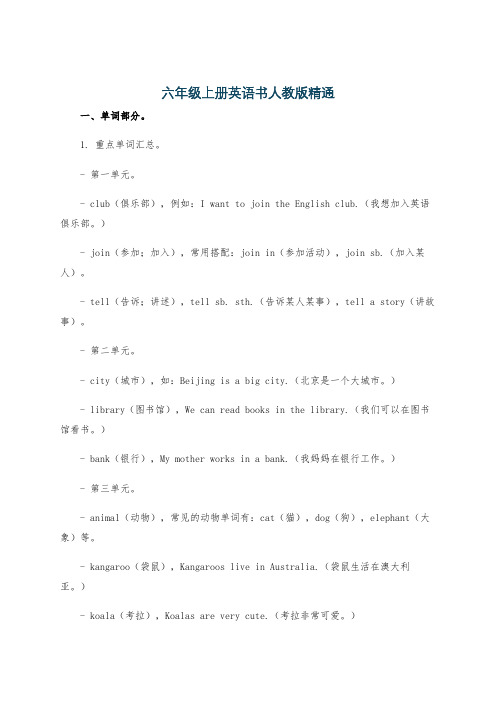
六年级上册英语书人教版精通一、单词部分。
1. 重点单词汇总。
- 第一单元。
- club(俱乐部),例如:I want to join the English club.(我想加入英语俱乐部。
)- join(参加;加入),常用搭配:join in(参加活动),join sb.(加入某人)。
- tell(告诉;讲述),tell sb. sth.(告诉某人某事),tell a story(讲故事)。
- 第二单元。
- city(城市),如:Beijing is a big city.(北京是一个大城市。
)- library(图书馆),We can read books in the library.(我们可以在图书馆看书。
)- bank(银行),My mother works in a bank.(我妈妈在银行工作。
)- 第三单元。
- animal(动物),常见的动物单词有:cat(猫),dog(狗),elephant(大象)等。
- kangaroo(袋鼠),Kangaroos live in Australia.(袋鼠生活在澳大利亚。
)- koala(考拉),Koalas are very cute.(考拉非常可爱。
)- 第四单元。
- hobby(爱好),My hobby is painting.(我的爱好是绘画。
)- reading(阅读),He likes reading books.(他喜欢读书。
)- dancing(跳舞),She is good at dancing.(她擅长跳舞。
)- 第五单元。
- country(国家),China is a great country.(中国是一个伟大的国家。
)- Australia(澳大利亚),There are many unique animals in Australia.(澳大利亚有很多独特的动物。
)- Canada(加拿大),Canada is famous for its maple leaves.(加拿大以枫叶闻名。
人教版六年级英语上册各单元知识点汇总
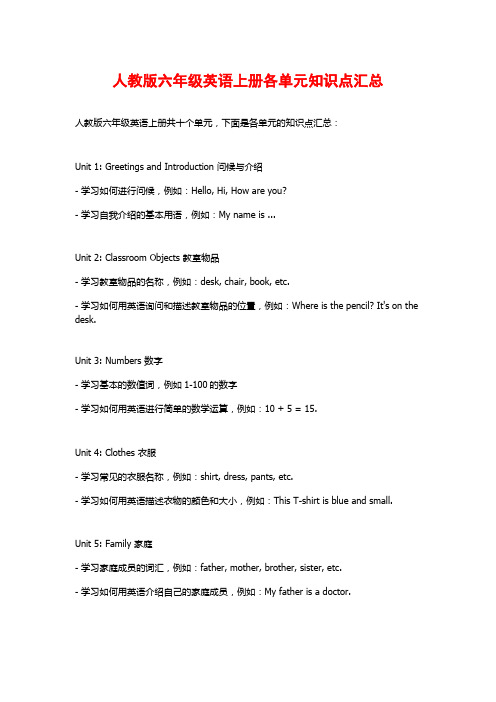
人教版六年级英语上册各单元知识点汇总人教版六年级英语上册共十个单元,下面是各单元的知识点汇总:Unit 1: Greetings and Introduction 问候与介绍- 学习如何进行问候,例如:Hello, Hi, How are you?- 学习自我介绍的基本用语,例如:My name is ...Unit 2: Classroom Objects 教室物品- 学习教室物品的名称,例如:desk, chair, book, etc.- 学习如何用英语询问和描述教室物品的位置,例如:Where is the pencil? It's on the desk.Unit 3: Numbers 数字- 学习基本的数值词,例如1-100的数字- 学习如何用英语进行简单的数学运算,例如:10 + 5 = 15.Unit 4: Clothes 衣服- 学习常见的衣服名称,例如:shirt, dress, pants, etc.- 学习如何用英语描述衣物的颜色和大小,例如:This T-shirt is blue and small.Unit 5: Family 家庭- 学习家庭成员的词汇,例如:father, mother, brother, sister, etc.- 学习如何用英语介绍自己的家庭成员,例如:My father is a doctor.Unit 6: Food 食物- 学习常见的食物名称,例如:apple, banana, bread, etc.- 学习如何用英语描述食物的味道和口感,例如:This banana is sweet and tasty.Unit 7: School Life 学校生活- 学习学校生活的用语,例如:go to school, have classes, play games, etc.- 学习如何用英语描述学校生活的常见活动,例如:I have English class at 9 o'clock.Unit 8: Hobbies and Free Time 爱好和业余时间- 学习常见的爱好词汇,例如:sing, dance, swim, etc.- 学习如何用英语询问和回答关于业余时间的问题,例如:What do you do in your free time? I like playing basketball.Unit 9: Daily Routine 日常生活- 学习描述日常活动的词汇,例如:get up, have breakfast, go to bed, etc.- 学习如何用英语描述自己的日常作息安排,例如:I get up at 7 o'clock in the morning.Unit 10: Travel and Places 旅行和地方- 学习关于旅行和地方的基本词汇,例如:train, bus, hotel, etc.- 学习如何用英语询问和指路,例如:Excuse me, how can I get to the post office? 希望对你有帮助!。
人教精通版小学英语六年级上册单元知识点总结(全册)(完美版)

Unit1Igotoschoolat8:00.一、核心词汇1.描述日常活动的词汇cleanthewindow擦窗户cleanthedoor擦门cleanthefloor擦地板2.描述三餐的词汇breakfast早餐lunch午餐dinner晚餐3.描述时间的词汇morning早晨afternoon下午evening晚上; 傍晚4.频率副词often时常; 常常5.其他walk走; 步行every每一个easy容易difficult困难二、拓展词组描述日常活动的词组getup起床havebreakfast吃早餐gotoschool去上学havelunch吃午饭gohome回家havedinner吃晚饭watchTV看电视gotobed睡觉cookbreakfast做早餐teachEnglish教英语takeawalk散步readstories读故事seeafilm看电影playthepiano弹钢琴三、核心句型1.Igetupat7:30inthemorning. 我早晨七点半起床。
解读:此句是一个陈述句, 用来描述我在某一时刻所做的事情。
举一反三:Igotoschoolat8:00inthemorning. 我早晨八点去上学。
她不在上午六点半起床。
2.Shedoesn’tgetupat6:30inthemorning.解读: 此句是一个否定句, 用来描述某人在某一时刻没有做的事情。
举一反三:Shedoesn’tgetupat6:40.她不在六点四十分起床。
3.— WhatdoyoudoonSaturdays? 你星期六做什么?— Ioftengoandseeafilmwithmyparents. 我经常和我的父母一起去看电影。
解读:这是用来询问对方某天做什么及其回答的句子。
举一反三:— Whatdoyoudoontheweekend? 你周末做什么?— Ioftendohomework. 我经常做作业。
完整版)小学英语人教精通版六年级上册重点归纳
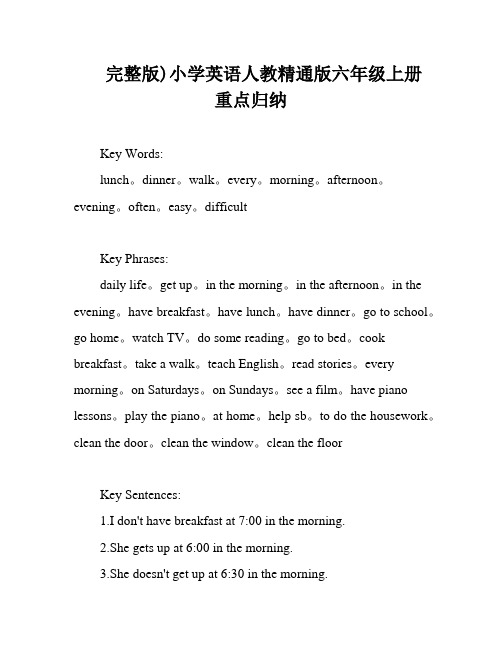
完整版)小学英语人教精通版六年级上册重点归纳Key Words:lunch。
dinner。
walk。
every。
morning。
afternoon。
evening。
often。
easy。
difficultKey Phrases:daily life。
get up。
in the morning。
in the afternoon。
in the evening。
have breakfast。
have lunch。
have dinner。
go to school。
go home。
watch TV。
do some reading。
go to bed。
cook breakfast。
take a walk。
teach English。
read stories。
every morning。
on Saturdays。
on Sundays。
see a film。
have piano lessons。
play the piano。
at home。
help sb。
to do the housework。
clean the door。
clean the window。
clean the floorKey Sentences:1.I don't have breakfast at 7:00 in the morning.2.She gets up at 6:00 in the morning.3.She doesn't get up at 6:30 in the morning.4.What does Kate do on Saturdays?5.She usually plays the piano.6.I have breakfast at 7:30.In daily life。
we have three meals a day: lunch。
dinner。
and breakfast。
We often walk to school。
小学英语人教精通版六年级上册重点归纳

小学英语人教精通版六年级上册重点归纳第一单元Unit 1 重点单词:lunch 午餐every 每一个evening 晚上difficult困难重点词组:1. daily life 日常生活3. in the morning 在早晨上午5. in the evening 在晚上7. have lunch 吃午餐walk 走;步行afternoon 下午easy容易2. get up 起床4. in the afternoon 在下午6. have breakfast 吃早餐8. have dinner 吃晚餐10. go home 回家12. do some reading 阅读14. cook breakfast 做早餐16. teach English 教英语18. every morning 每天早晨20. on Sundays 在星期日22. have Pia no IeSS OnS 上钢琴课24. at home 在家25. help sb. to do the housework帮助某人做家务26. clea n the door扌察门27. clean the window 擦窗户I go to school at 8:00dinner 晚餐morning 早上often时常;常常9. go to school 去上学11. watch TV 看电视13. go to bed 睡觉15. take a walk 散步17. read stories 读故事19. on Saturdays 在星期六21. see a film 看电影23. play the piano 弹钢琴28. clean the floor 擦地板重点句型:1.I don'h t ave breakfast at 7:00 in the morning .我不是在早上七点钟吃早餐。
2.She gets up at 6:00 in the morning 她. 在早上六点钟起床。
人教精通版小学英语六年级上册重点归纳
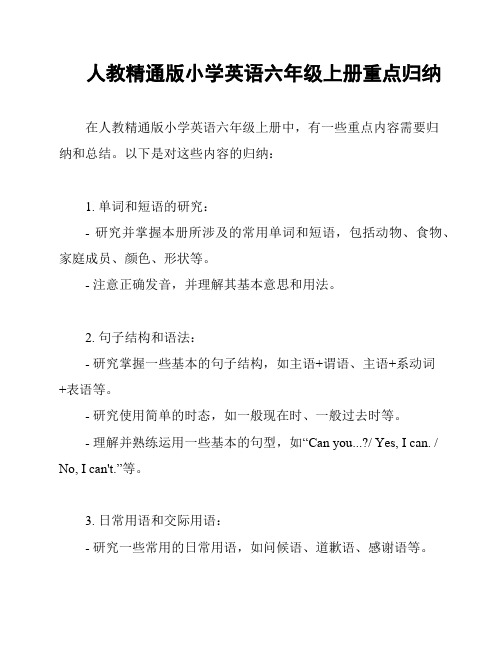
人教精通版小学英语六年级上册重点归纳
在人教精通版小学英语六年级上册中,有一些重点内容需要归
纳和总结。
以下是对这些内容的归纳:
1. 单词和短语的研究:
- 研究并掌握本册所涉及的常用单词和短语,包括动物、食物、家庭成员、颜色、形状等。
- 注意正确发音,并理解其基本意思和用法。
2. 句子结构和语法:
- 研究掌握一些基本的句子结构,如主语+谓语、主语+系动词
+表语等。
- 研究使用简单的时态,如一般现在时、一般过去时等。
- 理解并熟练运用一些基本的句型,如“Can you...?/ Yes, I can. / No, I can't.”等。
3. 日常用语和交际用语:
- 研究一些常用的日常用语,如问候语、道歉语、感谢语等。
- 研究并练简单的交际用语,如问答基本信息、提出请求、表达意见等。
4. 阅读理解:
- 阅读短文或简单的对话,理解其中的基本内容和信息。
- 掌握提取关键信息的技巧,如找出主题句、主要人物等。
5. 听力训练:
- 听取简短的对话或句子,理解其基本意思。
- 提高听力技巧,包括听清语音、辨别关键词等。
6. 书写和拼写:
- 研究正确书写和拼写常见的单词和短语。
- 注意字母大小写和书写规范。
以上是人教精通版小学英语六年级上册的重点归纳。
通过研究这些内容,可以提高英语听、说、读、写的能力,为接下来的研究打下基础。
> *注意:上述内容为总结归纳,具体细节和例句可详细阅读教材内容。
*。
六年级上英语精通版
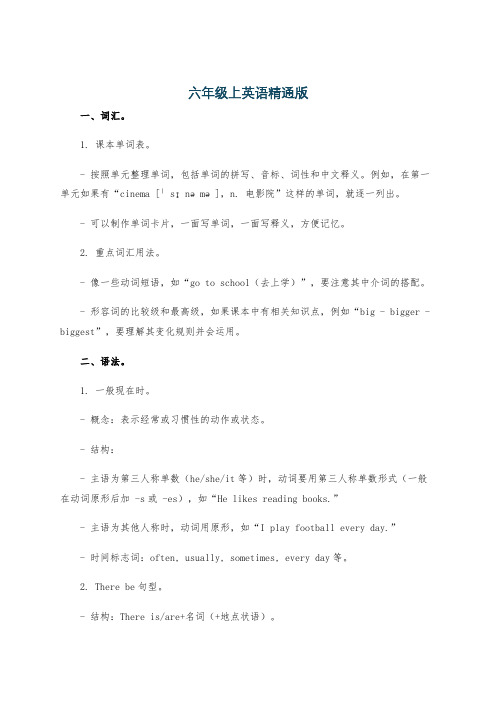
六年级上英语精通版一、词汇。
1. 课本单词表。
- 按照单元整理单词,包括单词的拼写、音标、词性和中文释义。
例如,在第一单元如果有“cinema [ˈsɪnəmə],n. 电影院”这样的单词,就逐一列出。
- 可以制作单词卡片,一面写单词,一面写释义,方便记忆。
2. 重点词汇用法。
- 像一些动词短语,如“go to school(去上学)”,要注意其中介词的搭配。
- 形容词的比较级和最高级,如果课本中有相关知识点,例如“big - bigger - biggest”,要理解其变化规则并会运用。
二、语法。
1. 一般现在时。
- 概念:表示经常或习惯性的动作或状态。
- 结构:- 主语为第三人称单数(he/she/it等)时,动词要用第三人称单数形式(一般在动词原形后加 -s或 -es),如“He likes reading books.”- 主语为其他人称时,动词用原形,如“I play football every day.”- 时间标志词:often, usually, sometimes, every day等。
2. There be句型。
- 结构:There is/are+名词(+地点状语)。
- 区别:is用于单数名词或不可数名词,are用于复数名词。
例如“There is a book on the desk.”和“There are some books on the desk.”- 就近原则:如果be动词后面有多个名词,be动词的形式要根据离它最近的名词的单复数来确定,如“There is a pen and two pencils in the box.”三、句型。
1. 询问职业。
- What does your father do? He is a doctor.- 要学会替换不同的职业单词,如teacher, worker, driver等。
2. 询问爱好。
- What are your hobbies? I like singing and dancing.- 注意hobby(单数)和hobbies(复数)的用法区别。
小学英语人教精通版六年级(上册)重点归纳

小学英语人教精通版六年级上册重点归纳第一单元Unit 1 I go to school at 8:00重点词组:1. daily life 日常生活2. get up 起床3. in the morning 在早晨\上午4. in the afternoon 在下午5. in the evening 在晚上6. have breakfast 吃早餐7. have lunch 吃午餐8. have dinner 吃晚餐9. go to school 去上学10. go home 回家%11. watch TV 看电视12. do some reading 阅读13. go to bed 睡觉14. cook breakfast 做早餐15. take a walk 散步16. teach English 教英语17. read stories 读故事18. every morning 每天早晨19. on Saturdays 在星期六20. on Sundays 在星期日21. see a film 看电影22. have piano lessons 上钢琴课23. play the piano 弹钢琴24. at home 在家25. help sb. to do the housework 帮助某人做家务>26. clean the door 擦门27. clean the window 擦窗户28. clean the floor 擦地板29. eat lunch 吃午餐重点句型:don’t have breakfast at 7:00 in the morning . 我不是在早上七点钟吃早餐。
gets up at 6:00 in the morning . 她在早上六点钟起床。
doesn’t get up at 6:30 in the morning . 她不是在早上6:30起床。
人教精通版六年级英语上册全册单元知识点
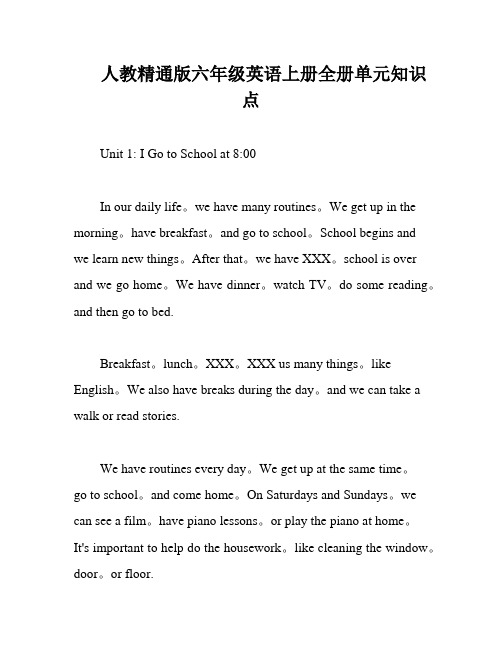
人教精通版六年级英语上册全册单元知识点Unit 1: I Go to School at 8:00In our daily life。
we have many routines。
We get up in the morning。
have breakfast。
and go to school。
School begins andwe learn new things。
After that。
we have XXX。
school is over and we go home。
We have dinner。
watch TV。
do some reading。
and then go to bed.Breakfast。
lunch。
XXX。
XXX us many things。
like English。
We also have breaks during the day。
and we can take a walk or read stories.We have routines every day。
We get up at the same time。
go to school。
and come home。
On Saturdays and Sundays。
we can see a film。
have piano lessons。
or play the piano at home。
It's important to help do the housework。
like cleaning the window。
door。
or floor.In summary。
our daily life is full of routines and activities。
Some are easy。
while others are difficult。
but they all help us grow and learn.Unit 2 What's Your Hobby?Do you have any hobbies。
小学英语人教精通版六年级上册重点归纳之欧阳学创编
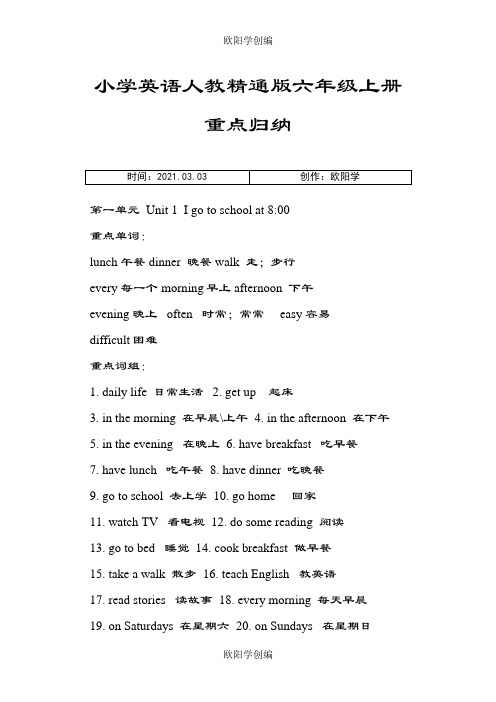
小学英语人教精通版六年级上册重点归纳第一单元 Unit 1 I go to school at 8:00重点单词:lunch 午餐 dinner 晚餐walk 走;步行every 每一个 morning早上afternoon 下午evening 晚上 often 时常;常常 easy 容易difficult困难重点词组:1. daily life 日常生活2. get up 起床3. in the morning 在早晨\上午4. in the afternoon 在下午5. in the evening 在晚上6. have breakfast 吃早餐7. have lunch 吃午餐 8. have dinner 吃晚餐9. go to school 去上学 10. go home 回家11. watch TV 看电视 12. do some reading 阅读13. go to bed 睡觉 14. cook breakfast 做早餐15. take a walk 散步 16. teach English 教英语17. read stories 读故事 18. every morning 每天早晨19. on Saturdays 在星期六 20. on Sundays 在星期日21. see a film 看电影 22. have piano lessons 上钢琴课23. play the piano 弹钢琴 24. at home 在家25. help sb. to do the housework 帮助某人做家务26. clean the door 擦门 27. clean the window 擦窗户28. clean the floor 擦地板重点句型:1.I don’t have breakfast at 7:00 in the morning . 我不是在早上七点钟吃早餐。
人教精通版六年级英语上册全册单元知识点
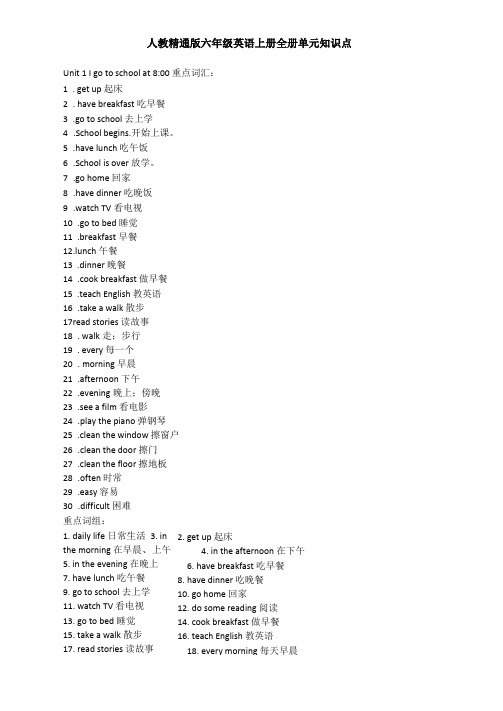
人教精通版六年级英语上册全册单元知识点Unit 1 I go to school at 8:00 重点词汇:1. get up 起床2. have breakfast 吃早餐3.go to school 去上学4.School begins.开始上课。
5.have lunch 吃午饭6.School is over 放学。
7.go home 回家8.have dinner 吃晚饭9.watch TV看电视10.go to bed 睡觉11.breakfast 早餐12.lunch 午餐13.dinner 晚餐14.cook breakfast 做早餐15.teach English 教英语16.take a walk 散步17read stories 读故事18. walk走;步行19. every 每一个20. morning 早晨21.afternoon 下午22.evening晚上;傍晚23.see a film 看电影24.play the piano 弹钢琴25.clean the window 擦窗户26.clean the door 擦门27.clean the floor 擦地板28.often 时常29.easy 容易30.difficult 困难重点词组:1. daily life日常生活3. in the morning 在早晨、上午5. in the evening 在晚上7. have lunch 吃午餐9. go to school 去上学11. watch TV 看电视13. go to bed 睡觉15. take a walk 散步17. read stories 读故事2. get up 起床4. in the afternoon 在下午6. have breakfast 吃早餐8. have dinner 吃晚餐10. go home 回家12. do some reading 阅读14. cook breakfast 做早餐16. teach English 教英语18. every morning 每天早晨19. on Saturdays 在星期六20. on Sundays 在星期日21. see a film 看电影22. have piano lessons 上钢琴课23. play the piano 弹钢琴24. at home 在家25.help sb. to do the housework 帮助某人做家务26.clean the door 擦门27. clean the window 擦窗户28. clean the floor 擦地板29. eat lunch 吃午餐重点句型:1.I don’t have breakfast at 7:00 in the morning .我不是在早上七点钟吃早餐。
小学英语人教精通版六年级上册重点归纳doc资料
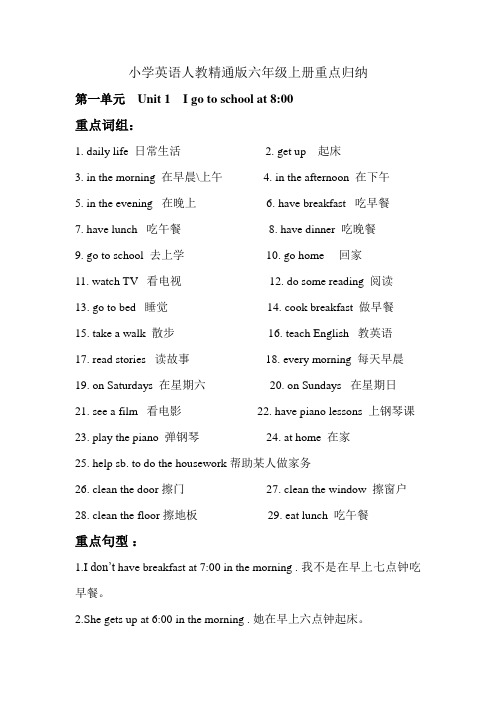
小学英语人教精通版六年级上册重点归纳第一单元Unit 1 I go to school at 8:00重点词组:1. daily life 日常生活2. get up 起床3. in the morning 在早晨\上午4. in the afternoon 在下午5. in the evening 在晚上6. have breakfast 吃早餐7. have lunch 吃午餐8. have dinner 吃晚餐9. go to school 去上学10. go home 回家11. watch TV 看电视12. do some reading 阅读13. go to bed 睡觉14. cook breakfast 做早餐15. take a walk 散步16. teach English 教英语17. read stories 读故事18. every morning 每天早晨19. on Saturdays 在星期六20. on Sundays 在星期日21. see a film 看电影22. have piano lessons 上钢琴课23. play the piano 弹钢琴24. at home 在家25. help sb. to do the housework 帮助某人做家务26. clean the door 擦门27. clean the window 擦窗户28. clean the floor 擦地板29. eat lunch 吃午餐重点句型:1.I don’t have breakfast at 7:00 in the morning . 我不是在早上七点钟吃早餐。
2.She gets up at 6:00 in the morning . 她在早上六点钟起床。
3.She doesn’t get up at 6:30 in the morning . 她不是在早上6:30起床。
人教精通版小学英语六年级上册单元知识点总结(全册)(完美版)

Unit1Igotoschoolat8:00.一、核心词汇1.描述日常活动的词汇cleanthewindow擦窗户cleanthedoor擦门cleanthefloor擦地板2.描述三餐的词汇breakfast早餐lunch午餐dinner晚餐3.描述时间的词汇morning早晨afternoon下午evening晚上; 傍晚4.频率副词often时常; 常常5.其他walk走; 步行every每一个easy容易difficult困难二、拓展词组描述日常活动的词组getup起床havebreakfast吃早餐gotoschool去上学havelunch吃午饭gohome回家havedinner吃晚饭watchTV看电视gotobed睡觉cookbreakfast做早餐teachEnglish教英语takeawalk散步readstories读故事seeafilm看电影playthepiano弹钢琴三、核心句型1.Igetupat7:30inthemorning. 我早晨七点半起床。
解读:此句是一个陈述句, 用来描述我在某一时刻所做的事情。
举一反三:Igotoschoolat8:00inthemorning. 我早晨八点去上学。
她不在上午六点半起床。
2.Shedoesn’tgetupat6:30inthemorning.解读: 此句是一个否定句, 用来描述某人在某一时刻没有做的事情。
举一反三:Shedoesn’tgetupat6:40.她不在六点四十分起床。
3.— WhatdoyoudoonSaturdays? 你星期六做什么?— Ioftengoandseeafilmwithmyparents. 我经常和我的父母一起去看电影。
解读:这是用来询问对方某天做什么及其回答的句子。
举一反三:— Whatdoyoudoontheweekend? 你周末做什么?— Ioftendohomework. 我经常做作业。
(完整版)小学英语人教精通版六年级上册重点归纳
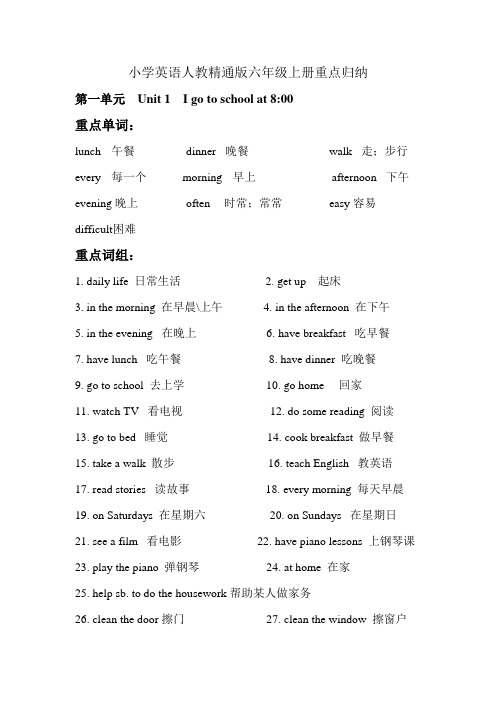
小学英语人教精通版六年级上册重点归纳第一单元Unit 1 I go to school at 8:00重点单词:lunch 午餐dinner 晚餐walk 走;步行every 每一个morning 早上afternoon 下午evening 晚上often 时常;常常easy 容易difficult困难重点词组:1. daily life 日常生活2. get up 起床3. in the morning 在早晨\上午4. in the afternoon 在下午5. in the evening 在晚上6. have breakfast 吃早餐7. have lunch 吃午餐8. have dinner 吃晚餐9. go to school 去上学10. go home 回家11. watch TV 看电视12. do some reading 阅读13. go to bed 睡觉14. cook breakfast 做早餐15. take a walk 散步16. teach English 教英语17. read stories 读故事18. every morning 每天早晨19. on Saturdays 在星期六20. on Sundays 在星期日21. see a film 看电影22. have piano lessons 上钢琴课23. play the piano 弹钢琴24. at home 在家25. help sb. to do the housework 帮助某人做家务26. clean the door 擦门27. clean the window 擦窗户28. clean the floor 擦地板重点句型:1.I don’t have breakfast at 7:00 in the morning . 我不是在早上七点钟吃早餐。
2.She gets up at 6:00 in the morning . 她在早上六点钟起床。
- 1、下载文档前请自行甄别文档内容的完整性,平台不提供额外的编辑、内容补充、找答案等附加服务。
- 2、"仅部分预览"的文档,不可在线预览部分如存在完整性等问题,可反馈申请退款(可完整预览的文档不适用该条件!)。
- 3、如文档侵犯您的权益,请联系客服反馈,我们会尽快为您处理(人工客服工作时间:9:00-18:30)。
人教精通版六年级英语上册各单元知识点汇总Unit 1 I go to school at 8:00.单元知识必备清单重点词汇breakfast 早餐lunch 午餐dinner 晚餐walk 走; 步行every 每一个morning 早晨evening 晚上; 傍晚often 时常; 常常afternoon 下午easy 容易difficult 困难重点短语see a film 看电影clean the window 擦窗户c lean the door 擦门clean the floor 擦地板get up 起床take a walk 散步go to school 去上学have breakfast 吃早餐go home 回家go to bed 睡觉cook breakfast 做早餐teach English 教英语read stories 读故事have lunch 吃午饭have dinner 吃晚饭play the piano 弹钢琴重点句型1 School begins at 9:00. 九点钟开始上课。
解读: 该句是一般现在时,其中主语School 是第三人称单数,所以谓语动词begin 用第三人称单数形式begins。
“School begins.”的同义句为“Class begins.”。
2 School is over at 3:30 in the afternoon. 下午三点半放学。
解读: 该句是谓语为系动词的一般现在时句型,主语School 是第三人称单数,所以be动词用is,“be over”意为“结束”,over 在此处是副词。
3 She gets up at 6:00 in the morning. 她在早晨六点起床。
She doesn’t get up at 6:30 in the morning. 她不在早晨六点半起床。
解读: 在一般现在时的肯定句中,主语是第三人称单数时,谓语动词要用第三人称单数形式。
句型结构: 肯定句: 主语(第三人称单数)+ 动词(第三人称单数形式)(+其他).否定句: 主语(第三人称单数)+ doesn’t + 动词原形(+其他).4 —What do you do on Saturdays? 你在周六做什么?—I often go and see a film. 我经常去看电影。
解读: 该问句为what 引导的特殊疑问句,用来询问对方在星期几做什么事情。
句型结构: —What do you do on +星期名词—I +频度副词+动词原形(+其他).Unit 2 What’s your hobby?单元知识必备清单重点词汇open 开; 打开 hobby 爱好collect 收集map 地图box 盒子colour 颜色dad 爸爸mum 妈妈plant 植物; 种植flower 花drink 喝tea 茶photo 照片kid 小孩baby 婴儿hungry 饿的cry 哭重点短语have a look 看一看look at 看plant flowers 种花take photos 照相go fishing 去钓鱼 a new toy car 一个新的玩具汽车make dolls 做布娃娃cook meals 做饭feed the baby 喂婴儿be interested in. . . 对……感兴趣take good care of. . . 把……照顾得很好play computer games 玩电脑游戏drink Chinese tea 喝中国茶collect toy cars/stamps/maps/picture cards 收集玩具汽车/ 邮票/ 地图/ 图片重点句型1 —What’s your hobby? 你的爱好是什么?—My hobby is collecting maps. 我的爱好是收集地图。
解读: 此问句用来询问对方的爱好。
其中hobby 是可数名词单数,所以回答中的be 动词用is,is 后面接动词的-ing 形式。
本问句有两种回答方式,分别为:(1)My hobby is... (2) I like...2 —What’s your dad’s hobby? 你爸爸的爱好是什么?—His hobby is planting flowers. 他的爱好是种花。
解读: 此句型用于询问并回答他人的爱好。
句型结构: —What’s + 形容词性物主代词/ 名词所有格+ hobby?—形容词性物主代词+ hobby is + 动词的-ing 形式(+其他).3 —What are you interested in? 你对什么感兴趣?—I’m interested in taking photos. 我对照相感兴趣。
解读: 此问句用于询问对方或他人对什么感兴趣。
“be interested in...”意为“对……感兴趣”,其后跟名词或动词的-ing 形式。
句型结构: —What is/are + 主语+ interested in?—主语+ am/is/are + interested in + 动词的-ing 形式(+其他).Unit 3 Would you like to come to my birthday party?单元知识必备清单重点词汇time 时间after 在……后then 那时me 我(I 的宾格) bye 再见kind 种类ice cream 冰激凌candy 糖果sure 当然light 点燃jelly 果冻重点短语light the candles 点蜡烛 a piece of cake 一块蛋糕sing the birthday song 唱生日歌make a wish 许愿blow out the candles 吹蜡烛c ut the cake 切蛋糕star-shaped/heart-shaped cake 星形/ 心形蛋糕invite your friends to your party 邀请朋友参加聚会celebrate your birthday with your friends 与朋友庆祝生日give a birthday card to your friend 向朋友赠送生日贺卡重点句型1 —Would you like to come to my birthday party?你愿意来参加我的生日聚会吗?—Sure. I’d love to. 当然。
我愿意。
解读: 该问句是以情态动词Would 开头的一般疑问句,用于向对方提出建议或邀请。
“would like to do sth.”作为固定搭配,表示“想要/愿意做某事”。
句型结构: Would you like to do sth. ?2 —What kind of cake would you like? 你想要什么种类的蛋糕?—I’d like a heart-shaped cake. 我想要一个心形蛋糕。
解读: 该问句是一个特殊疑问句,用于询问对方想要什么种类的物品。
句型结构: What kind of(什么种类的)+物品+would you like?3 —Can I have some ice cream? 我可以吃一些冰激凌吗? —Sure. 当然。
解读: “Can I have...?”多用在口语中,是以情态动词Can 开头的一般疑问句。
该句型用于向对方提出请求,本句中的have 意为“吃”。
4 —How do they celebrate the birthday? 他们如何庆祝生日?—First, they light the candles and then... 首先,他们点蜡烛,然后……解读: 该问句是由How 引导的特殊疑问句,对做某事的方式进行提问。
句式“First...and then...”常用来介绍做某事的步骤。
Unit 4 January is the first month.单元知识必备清单重点词汇January 一月February 二月March 三月April 四月May 五月June 六月back 回原处; 后面t heir 他(她、它)们的tree 树; 树木grass 草; 草地stop(使)停止egg 蛋; 卵重点短语go back home 回家plant trees 植树take a photo 照相go on a trip 去旅游in May 在五月show our love 表达我们的爱the fifth month of the year 一年里的第五个月the sixth month of the year 一年里的第六个月the first month of the year 一年里的第一个月the second month of the year 一年里的第二个月the third month of the year 一年里的第三个月the fourth month of the year 一年里的第四个月重点句型1 January is the first month of the year. 一月是一年里的第一个月。
解读: 该句型用来表达某月是一年里的第几个月。
of 表示“……的”; of the year 表示“一年中的……”。
句型结构: 月份+ is the +序数词+ month of the year.易错点提示: 通常情况下,在序数词前要加定冠词the。
但是当序数词前有形容词性物主代词或名词所有格修饰时,序数词前不用加the。
2 The children are skating. 孩子们正在滑冰。
解读: 此句型用于表达某些人正在做某事,因为主语The children 是复数,所以be 动词用are。
“be + 动词-ing形式”结构表示动作正在进行。
句型结构: 主语+ be + 动词-ing 形式(+其他).3 They want to stop the sand on windy days and make the air clean.他们想在有风的日子阻止沙尘,使空气变得清新。
解读: 此句型的时态为一般现在时,当主语是第三人称单数时,要用want 的第三人称单数形式wants。
want to do sth. 意为“想要做某事”。
句型结构: 主语+ want (s) to + 动词原形(+其他).Unit 5 July is the seventh month.单元知识必备清单重点词汇July 七月August 八月month 月year 年September 九月October 十月November 十一月December 十二月重点短语the Party’s birthday 党的生日go back to school 返回学校the seventh month of the year 一年里的第七个月the eighth month of the year 一年里的第八个月the ninth month of the year 一年里的第九个月the tenth month of the year 一年里的第十个月the eleventh month of the year 一年里的第十一个月the twelfth month of the year 一年里的第十二个月重点句型1 Look, the students are giving their teachers flowers to show their love.看,学生们正在给他们的老师送鲜花来表达他们的爱。
